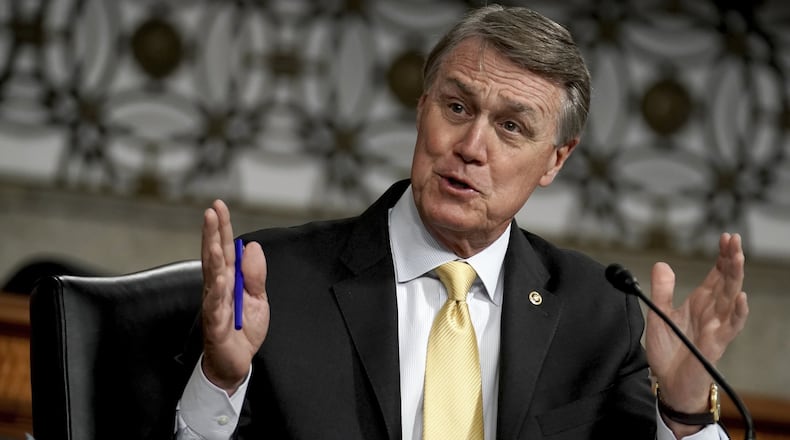With U.S. Sen. David Perdue’s re-election chances teetering on a knife’s edge, the Republican is talking more about himself as a “bipartisan problem solver” — and less about his reputation as one of President Donald Trump’s most loyal allies.
Democrat Jon Ossoff is keen to remind Georgians of the first-term incumbent’s voting record and history of stock trades, which he casts as a reflection of all that’s wrong with a “corrupt” Washington establishment.
While Georgia’s other U.S. Senate contest soaks up more attention, the race between Ossoff and Perdue has more quietly become one of the nation’s most competitive. Recent polls show no clear leader and a growing number of prognosticators rate it a tossup.
That helps explain why Perdue is pursuing a softer approach than he did during his first election six years ago, when he branded himself a deficit hawk to emerge from a crowded Republican field and defeat Democrat Michelle Nunn.
With the coronavirus-induced recession prompting skyrocketing federal spending, he’s not talking much about reducing the federal debt.
Nor is there an intense emphasis on Trump, who is struggling to separate himself from Democrat Joe Biden in recent Georgia polls. Perdue’s broadcast TV spots don’t mention Trump, though he’s featured in mailers and digital ads targeting core GOP voters.
Instead of scheduling a busy itinerary of in-person rallies and town halls, he’s relying on a wave of advertisements that promote his school safety plan, polish his health care agenda and tout his vote for a military pay hike.
And in recent weeks, Perdue has scarcely mentioned the hard-right themes that dominate the other Senate race, such as criticism of the Black Lives Matter movement.
Ossoff is eager to promote his own agenda, which includes expanding health care access, ensuring debt-free college tuition and rooting out corruption. But he also told The Atlanta Journal-Constitution he won’t let Perdue “distract” from his past record.
“Perdue’s team seems confused to me. It’s obvious David is not steering the ship,” Ossoff said. “He’s mostly been in hiding. All I’ve seen from them is this lame effort to deceive the public.”
He added: “When your entire record is plague, unemployment and corruption, it’s not a surprise that you’re hiding on a private island.”
Perdue’s messaging reflects Georgia’s electoral dynamics. Six years ago, he won with an outsider-themed campaign that focused on his plan to cut the nation’s deficit and oppose then-President Barack Obama’s health care agenda.
But the state has changed dramatically since then. Republicans accustomed to comfortable victories narrowly eked out statewide wins in 2018 as Democrats carved a blue streak through Atlanta’s suburbs.
Being one of Trump’s most loyal allies in the U.S. Senate might have helped him avoid a primary challenger in June. But to win in November, Perdue is trying to cast himself as a consensus builder who will defend capitalism.
“While people have a choice on the Republican side in the other race,” Perdue said in a recent interview, “my role is to hold us together in the bigger fight.”
‘Different games’
Perdue’s contest bears little resemblance to the other U.S. Senate race for good reason. He’s in a straight-up matchup with Ossoff and Libertarian Shane Hazel rather than the messy special election involving 21 candidates in the race for Loeffler’s seat — including the two Republicans aggressively competing for Trump voters.
After Marjorie Taylor Greene won a congressional GOP runoff in northwest Georgia, Collins and Loeffler raced to congratulate her despite her history of xenophobic remarks and her belief in the baseless QAnon conspiracy theory. The reason: They don’t want to risk alienating the conservatives each is courting.
But Perdue was pointedly silent on Greene’s victory, mindful that Democrats are eager to tie him to her incendiary brand of politics.
While Collins and Loeffler have tried to outdo each other with criticism of the violent offshoots of the protests for social justice, Perdue’s first ad emphasized the need to “put politics aside” to ensure “real police reform.”
“There’s no play to the middle for either party until the runoff” in Loeffler’s race, said Brian Robinson, a veteran GOP strategist. “This is why the messaging for Loeffler and Collins almost never intersects with Perdue’s. They’re playing very different games at this juncture.”
‘Privileged’ vs. 'Corrupt’
The race has only grown more intense. The Senate Leadership Fund — a GOP group with ties to Senate Majority Leader Mitch McConnell — devoted more money to assail Ossoff through early September than any other Democratic candidate in the nation.
And a poll released last week, conducted for the AARP, shows Perdue in a neck-and-neck contest with Ossoff — and only a narrow lead for the Republican among voters older than 50, traditionally a reliable bloc of conservative votes in Georgia.
Accordingly, Perdue’s campaign broadsides have started to sharpen. He’s increasingly pushed a law-and-order message that echoes Trump’s warnings that a Democratic victory will undermine public safety, and sought to tie Ossoff to the “defund” police initiative.
And he recently launched his most scathing TV attack yet on Ossoff, casting the Democrat as a “privileged, inexperienced” wannabe politician.
Ossoff’s ads have also gotten harsher. His latest round scrutinizes nearly 100 stock transactions made on Perdue’s behalf from late January through mid-February, as the pandemic worsened, some from firms that surged and others that struggled.
(Perdue has said the trades were handled by advisers who operated independently and later announced those third-party aides would no longer trade stocks in individual companies on his behalf.)
“My business investigates corruption all over the world,” Ossoff said. “And this is corruption.”
On the (virtual) trail
Democrats see Perdue’s approach as an attempt to whitewash his record.
“The advent of Trump pushed Perdue to the right,” said Howard Franklin, a veteran Democratic strategist. “He’s said and done a number of things the last four years that will be very difficult to walk away from. And Ossoff isn’t going to let him.”
Indeed, the Democrat’s campaign seized on a recent Perdue ad to highlight the Republican’s attempt to play to the middle.
In the ad, Perdue asserts that “health insurance should always cover preexisting conditions — for anyone, period.” But it leaves out his votes to repeal the Affordable Care Act and his support of a GOP lawsuit that threatens to gut the Obama-era health care overhaul.
Perdue in 2019 sponsored legislation aimed at ensuring coverage of people with pre-existing conditions, but experts claim it doesn’t match Obamacare’s protections. His campaign said his measure promotes “free-market solutions” that will lower costs and expand health care access.
As November nears, both Ossoff and Perdue cut a low-profile — in person, at least.
Though Ossoff hasn’t yet returned to the physical campaign trail, he’s held near-daily virtual town halls and press conferences. A few days ago, he staged an online event on his higher education policy that attracted roughly 120,000 viewers.
“My schedule is relentless in its transparency and accessibility,” Ossoff said. “That David Perdue is in hiding is not surprising, because if you were David Perdue would you want to answer questions in public right now?”
Perdue has held no town halls or rallies in recent weeks — and instead prefers small-scale events such as tours of local businesses that benefited from stimulus checks. Lately, also he’s been recuperating from a knee surgery while shuttling back and forth to Washington for votes.
At one visit to a Doraville clinic, he previewed his closing message. It presented him as a bulwark against left-leaning policies while trying to tie all Democrats to the most liberal wing of the party.
“We have freedoms that very few other countries have, and we take a lot of things for granted,” he said. “I’m hopeful that what we’re able to do in this race is contrast what the Democrats are really trying to do — which is change us to a socialist state.”
About the Author
Keep Reading
The Latest
Featured






